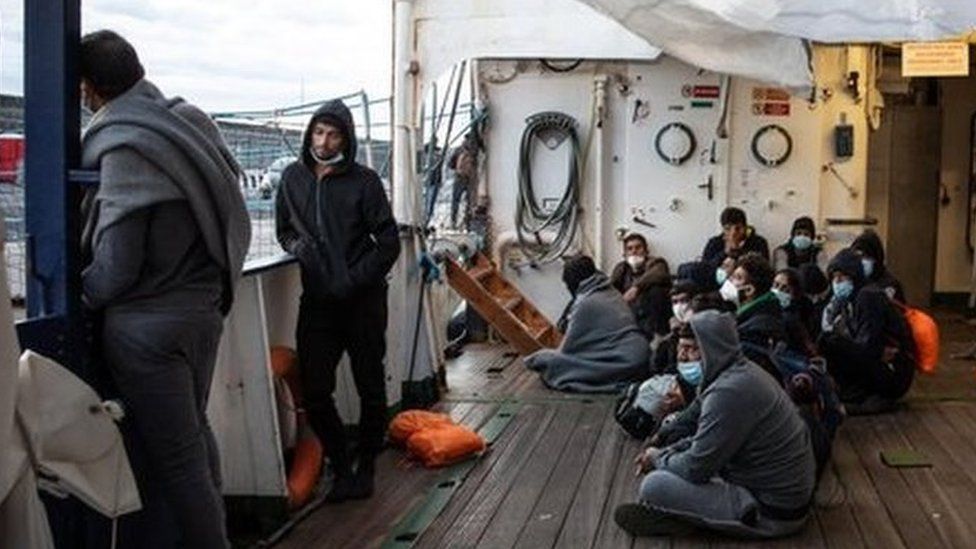France's Plan To Deport Migrants To Remote Island Sparks Outrage

Table of Contents
The Proposed Deportation Plan: Location, Logistics, and Legality
The French government's plan involves deporting undocumented migrants and asylum seekers to a yet-to-be-officially-named remote island territory. While the exact location remains undisclosed, fueling speculation and further criticism, logistical challenges are immediately apparent. Transporting a large number of individuals, providing adequate infrastructure (housing, healthcare, sanitation), and ensuring sufficient resources on a remote island pose significant hurdles. The estimated cost, likely substantial, has yet to be publicly released, further adding to the controversy surrounding the plan.
The legality of such a plan is also heavily contested. Critics argue that it violates both international human rights law, specifically the principle of non-refoulement (the prohibition of returning individuals to a place where they face a threat of persecution or torture), and French domestic law concerning asylum seekers. Legal challenges are anticipated, particularly concerning the due process rights of those targeted for deportation.
- Island's geographical location and characteristics: Currently unknown, leading to concerns about suitability and accessibility.
- Estimated costs associated with the plan: Unclear, but likely to be very high, adding to public criticism.
- Legal precedents and potential legal challenges: Previous similar attempts in other countries have faced significant legal setbacks. The French plan is expected to face similar challenges.
- Provisions for asylum seekers: The lack of transparency around provisions for asylum seekers raises serious concerns about potential human rights abuses.
International Condemnation and Human Rights Concerns
The proposed deportation plan has drawn sharp criticism from international organizations and governments worldwide. The UNHCR (United Nations High Commissioner for Refugees) has expressed deep concerns, citing potential violations of international human rights law and emphasizing the importance of upholding the principle of non-refoulement. The EU has also voiced reservations, urging France to adhere to its international obligations. Numerous human rights organizations have condemned the plan, highlighting the potential for inhumane treatment, lack of due process, inadequate healthcare, and the risk of violence against vulnerable individuals.
- Statements from international organizations: Strong condemnations from UNHCR and other international bodies have highlighted the severe human rights implications of the plan.
- Specific human rights concerns: Concerns include potential for abuse, lack of access to healthcare, inadequate living conditions, and the denial of due process.
- Comparison to similar deportation policies in other countries: Similar policies in other countries have often been deemed illegal and inhumane, setting a worrying precedent.
Public Opinion and Domestic Political Reactions
The French public is deeply divided on the issue. Large-scale protests have taken place in major cities across France, with activists demanding the abandonment of the plan. Online petitions have gathered thousands of signatures, reflecting the widespread opposition. Media coverage has been extensive, with prominent news outlets highlighting both the government's justification for the plan and the strong counter-arguments from human rights advocates. Political reactions are similarly divided, with some parties supporting the government's stance, others vehemently opposing it, and still others taking more nuanced positions. The potential impact on upcoming elections remains to be seen, but the issue is likely to remain a key topic of debate.
- Summary of public opinion polls: Polls reveal a significant portion of the public disapproves of the government's plan.
- Statements from prominent political figures: Strong opinions from across the political spectrum demonstrate the highly divisive nature of the issue.
- Coverage in major French news outlets: Extensive coverage demonstrates the significant public attention and debate surrounding the plan.
- Potential long-term political consequences: The plan may significantly impact the political landscape, both in the short and long term.
Alternative Solutions and Immigration Policy Debate
The controversy surrounding France's deportation plan highlights the need for a broader discussion on alternative solutions to managing migration flows. Successful integration programs in other European countries, focusing on language training, job placement, and cultural understanding, offer potential models for France. Strengthening border controls, while respecting human rights, is another aspect of the debate. Reform of French asylum law, ensuring efficient and fair processing of applications, could also alleviate pressure on the system. The debate extends beyond the immediate controversy, necessitating a comprehensive review of France’s immigration policy within the broader European context.
- Examples of successful integration programs in other countries: Several European countries have implemented successful integration models that could serve as inspiration for France.
- Discussion of different approaches to border control: A balanced approach to border control that respects human rights is crucial.
- Potential reforms to French asylum law: Modernizing the asylum system could streamline the process and prevent bottlenecks.
Conclusion: The Future of France's Migrant Deportation Policy and the Ongoing Outrage
France's plan to deport migrants to a remote island remains deeply controversial. While the government justifies the plan as a necessary measure to control illegal immigration, the international community and a significant portion of the French public express serious concerns about its human rights implications and legal viability. The ongoing outrage underscores the urgency of finding humane and legally sound solutions to manage migration flows. The future of this plan remains uncertain, but the debate surrounding France's immigration policy, and specifically this controversial deportation proposal, is likely to continue for some time. We urge readers to remain informed about the developments in this important story, to engage in respectful discussion, and to carefully consider the ethical implications of France's controversial immigration policy and the ongoing debate surrounding migrant deportations in France.

Featured Posts
-
 Your Guide To Chateau Diy Simple Steps For A Luxurious Look
May 19, 2025
Your Guide To Chateau Diy Simple Steps For A Luxurious Look
May 19, 2025 -
 Celebrated Singer Announces Final Show Following Memory Diagnosis
May 19, 2025
Celebrated Singer Announces Final Show Following Memory Diagnosis
May 19, 2025 -
 Brockwell Park Campaigner Wins Legal Battle Over Usage
May 19, 2025
Brockwell Park Campaigner Wins Legal Battle Over Usage
May 19, 2025 -
 Libraries Devastated Staff And Service Reductions After Trumps Agency Dismantling
May 19, 2025
Libraries Devastated Staff And Service Reductions After Trumps Agency Dismantling
May 19, 2025 -
 Amazon Faces Union Challenge Over Quebec Warehouse Closure
May 19, 2025
Amazon Faces Union Challenge Over Quebec Warehouse Closure
May 19, 2025
